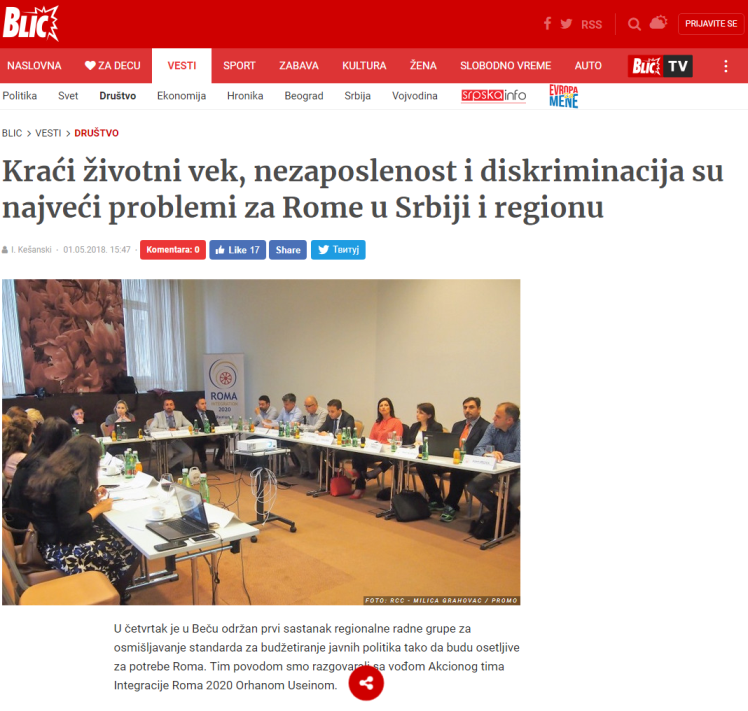Interview of RI2020 Action Team Leader Orhan Usein for Blic: Shorter life expectancy, unemployment and discrimination are the biggest problems for Roma in Serbia and the region
- 01 May 2018
- News

Printscreen: Interview with RI2020 Action Team Leader Orhan Usein in Serbian news portal Blic
Serbian news portal Blic published an interview with the Roma Integration 2020 (RI2020) Action Team Leader Orhan Usein. Usein spoke about the overall situation of Roma population in the region and RI2020 activities and achievements. The entire interview is available below.
On Thursday, the first meeting of the Working Group for developing regional standards for public policies budgeting was held in Vienna, to ensure these policies are sensitive to the needs of Roma. On this occasion, we talked to the leader of the Roma Integration 20120 Action Team, Orhan Usein.
What was discussed at
the meeting in Vienna? Are you satisfied with the results of the meeting?
The first meeting was
very successful. The Working Group adopted the methodology and the rules of
procedure, and also the activities for the following period. The discussion
focused on the budgeting systems of the participating economies and the concept
of Roma responsible budgeting was elaborated. Although this was an initial
meeting, we have already considered the options for action that should lead to
Roma responsible budgeting and improved policy implementation. The experts met
with their colleagues with whom they will work in the field and I can say that
a very positive working atmosphere has been created.
What are the greatest
achievements of the Roma Integration 2020 Project in the past two years?
Above all, a
functional system for implementation of activities related to Roma integration
has been established. The governments in the enlargement region have an
institutional framework to work on Roma integration, there are National Roma Contact
Points, inter-ministerial coordination and monitoring bodies, strategies and
action plans for their implementation. The Roma Integration 2020 Project of the
Regional Cooperation Council (RCC) is a platform for dialogue at national and
regional level, which contributes to identifying the shortcomings and
challenges that Roma integration faces, and also to proposing solutions that
are widely used as a starting point in enlargement talks with the European
Union. We have achieved regular annual reporting in the area of Roma
integration policies and have adopted a common reporting method for all
countries in the enlargement region. The information from the reports directs
our further work in close cooperation with the European Union and the
governments of the region. Although there are problems with the implementation
of integration policies, and in particular with the lack of resources that are allocated
for them, we have managed to identify the problems and start the process of
solving them. On the basis of the analysis of reports and other indicators, we
have determined that the budgeting of measures for Roma integration was one of
the priorities, which resulted in the establishment of this Working Group.
What do you expect to
achieve by the end of the year?
The project will be
finalized by the end of 2018, which is very near, although we certainly hope
that the project will be extended to the following period. Roma integration is
a very slow process and requires long-term engagement and lots of human and financial
resources. However, the greatest ambition for this year is the successful finalization
of the activities of the Working Group for budgeting. By the end of the year we
intend to offer the governments in the region applicable and concrete solutions
for quality policy budgeting and implementation and to initiate the adoption of
these solutions. The applied solutions would lead to very tangible improvements
in the lives of Roma, which is the ultimate goal we are pursuing.
In addition, we are planning
conference on the topic of housing, and also employment. Our goal is to reach
the minimum regional standards in these areas, to find out which solutions work
best, and to initiate joint action on these issues in the next period.
We will continue to
work on maintaining and improving the institutional framework for Roma
integration and we will continue to maintain the project as a platform for
national and regional dialogue on this issue.
What are the biggest
problems faced by Roma in Serbia and the region?
Unfortunately, the
problems are far too many, and it will probably require a lot of space to
mention them all. The most distressing fact is that Roma live much shorter than
the rest of the population in the region. Of course, this is due to a
combination of causes. Roma often live in sub-standard housing conditions,
which has a negative impact on their health and life expectancy. If we add to
this the level of poverty so great that ultimately prevents access to the
education system and the labour market, I can only say that Roma children start
their lives in so much more unfavourable socio-economic position than the rest
of the population that getting out of such a situation is more than difficult
and almost impossible.
The key reason for the
state of the Roma, characterized by exclusion and poverty, is found in the
phenomenon of anti-Gypsyism, which is a form of racism towards Roma, manifested
in various forms of discrimination. This is also recognized by the European
Union, so we expect that discrimination against Roma will be a key and primary
area raised at the level of the first priority, on which the Roma integration
policy of the European Union will focus after 2020.
There are, of course, systemic problems that affect the addressing of the issues related to Roma integration, and there are also specific challenges particularly related to these policies. Apart from the need for strengthening the capacity of institutional structures dealing with this issue, establishing an effective system for prevention and protection against discrimination, allocation of sufficient financial resources for the implementation of Roma integration policies, establishing direct channels for access of the Roma community to public services, etc., it is also necessary to work on harmonizing all these aspects with the activities of the European Union and its members on the issue of Roma integration, which is also one of our goals. We believe that the regional approach to this issue is of added value, not only because Roma communities in the region are relatively small and they share very similar problems, but also because the regional approach makes it easier to establish standards and transfer them to every economy involved.
How can these problems be solved?
The problems can be solved only by great dedication and joint work. The role of the government is very important, because it is the policy holder. However, we need to adjust the policies to the real situation so that they can be effective. The measures that are implemented must correspond to the set objectives and the situation on the ground. Notwithstanding the good intentions, the reports show that much work is being done, but that it does not have a significant effect in terms of sustainable improvement of the lives of Roma. This should show us that the planned measures should be improved, adjusted and even changed in order to reach the final beneficiaries and achieve the desired results, which is basically full integration of Roma into socio-economic life in the region. In addition, the excuses that Roma refuse to take part in the measures, or that these measures are misused by Roma, and also non-Roma, are completely needless. A good plan takes into account the conditions, needs and desires of potential users, social goals, and also possible risks. Everything needs to be well planned and systematically implemented.
Furthermore, it is very important to work on establishing trust between the institutions and the Roma population, as well as to start from asking the Roma what they want for themselves, taking into account the social goals. In the future, it will be very important to combat racism and discrimination, which are the ultimate causes of the vast majority of the problems we are talking about. We will try to target not only Roma but also the broader society with our activities, in order to point out the problems and raise awareness about them. In the second phase of the Roma Integration 2020 project, we are planning to upgrade the established work standards and come even closer to the European Union regarding the Roma integration.
How to fight prejudice towards Roma?
All things considered, the fight against prejudice is the most difficult task. Prejudice acts in a way that is often invisible and very difficult to suppress. In a situation of social and economic decline, we notice that even countries at a far higher level of social development are facing problems with prejudice and the strengthening of the far-right parties. Nevertheless, what is most important is that the institutions, as representatives of the people, in cooperation with the civil sector and international organizations, send a clear message that this cannot be tolerated. One way of achieving this is by taking concrete actions and final decisions against those who openly discriminate. In addition, it will also be required to work on the education and the struggle against the internalization of prejudices.
As far as data are concerned, research regrettably proves that prejudice persists despite everything. As an example from life, it is very difficult for Roma to get employed even when we are talking about a highly qualified candidate, as shown in the Balkan Barometer - a survey conducted by the Regional Cooperation Council. The data we have available indicate that every third Roma has experienced discrimination in the course of the year, which is a devastating fact for the societies that call themselves civilized and strive to join the European Union.
Are you satisfied with the cooperation with the governments in the Balkans and Turkey?
Cooperation is increasingly improving. I am very pleased. We have managed to identify the problems and a growing number of civil servants are working with us on solving the problems and on the Roma inclusion. We are constantly trying to improve this cooperation, strengthen it, and of course ensure there is room for it. However, my general assessment is that we are on the right track, and that there is willingness for cooperation.
What is the situation with Roma in the EU countries, are they more integrated there?
The situation within the European Union varies, and it is not possible to speak of an equal level of integration. However, Roma also face discrimination in the European Union, especially in some of the countries. The European Union itself is also working on the resolution of these problems and is trying to find ways not only to speed up the integration, but also to respond to the problems of pronounced xenophobia. It can be said that in the Balkans we are in some aspects in a similar situation in this respect. That is why it is important that we work together and continue in this way. Today, Europe is very much interrelated, and the results in one part cannot come independently from the results in the other.
Original interview in available here.






